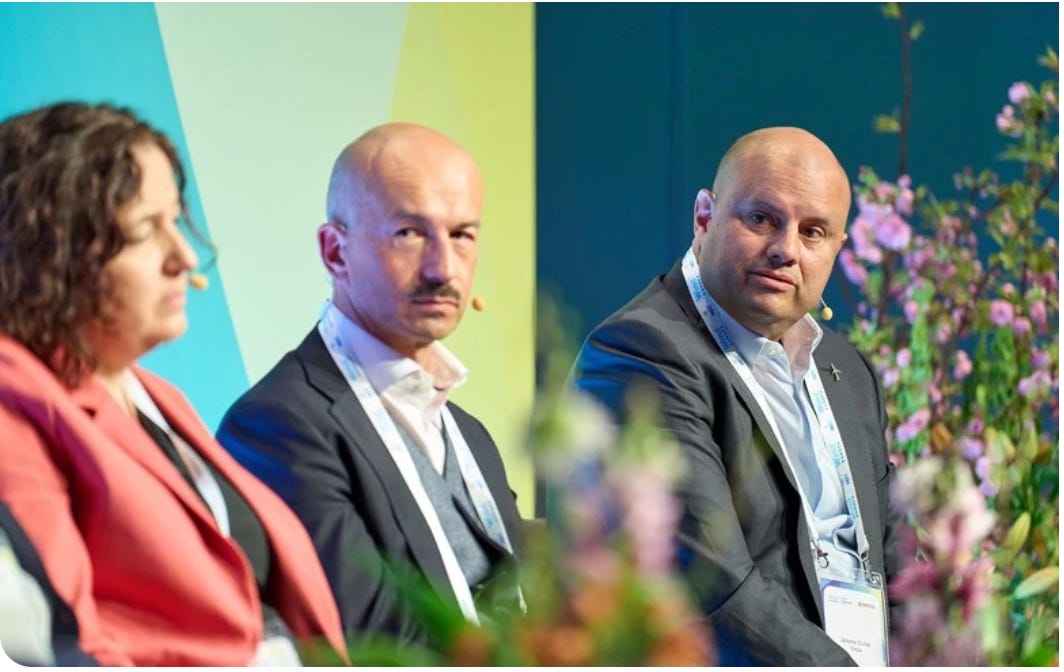Renewables Now did an interview after my participation at WindEurope in Copenhagen last month, and have kindly allowed me to crosspost it here, below the fold.
There was another article on that panel in EnergyWatch, but it’s behind a paywall. I can send the article bilaterally on request, it does have juicy quotes, I’ll just include one here:
Guillet asserts that Power Purchase Agreements are basically a poor substitute for CfDs, and he knows that people get angry when he says this.
“PPAs provide the price stability you need, but you get it from a weaker counterparty and typically with contracts that have different features,” he says and continues:
“PPAs should not be prevented, and of course it should be a free choice for companies to do so. But basically it will lead to more expensive electricity.”
Vattenfall did have a post on LinkedIn about our panel, but they must have been annoyed by the above (I specifically discussed the Vattenfall-BASF PPAs on Dutch offshore wind farms during the panel) because they seem to have cut me off from the videos of the panel…
Photo: WindEurope
The RenewablesNow interview
Companies with a high cost of capital, such as oil and gas players, are not natural investors for the renewable energy sector, according to Jerome Guillet, Managing Director at financial advisory firm SNOW.
Speaking at WindEurope 2025 and in a follow-up conversation, Guillet stressed that while the exit of such players from the renewables sector is generating negative noise, it is ultimately not a bad thing. “Thank God the oil companies are getting out of the sector,” Guillet said on a panel during the wind industry’s recent annual event in Copenhagen.
Renewables need long-term, stable, cheap capital, he argues. “The cheaper the capital, the cheaper the electricity,” Guillet, who previously founded Green Giraffe, said. Companies with expensive capital need higher returns and could drive up the cost of clean energy.
Guillet said that oil and gas investors are right to oppose allocating capital to renewables because their capital is better suited to high-risk endeavors like oil and gas production. If society wants to discourage oil and gas development, it should be done through regulation and taxation, not by steering fossil fuel majors into renewables. “It’s a very inefficient way to correct things,” he said.
He also pointed out that oil and gas majors often entered the renewables sector by overpaying (as they were rewarded at the time by investors), only to later exit when investor fashion changes and financial returns disappoint. "They come in, overpay, complain it's too expensive, and then leave noisily, making negative comments about the industry that get a lot of visibility and sell the assets in the meantime," he commented.
Instead, low-risk, low-cost-of-capital investors, such as utilities, pension funds, and financial investors focused on stable returns, are the appropriate owners of renewable assets, particularly once projects are operational. Oil and gas companies could participate during the risky development phase, but the problem is that renewable development is not that expensive, Guillet told Renewables Now. “It's hard to deploy billions in renewables development. This part is high risk, high returns, but relatively small amounts.”
According to the finance expert, contracts for difference (CfDs) are a good mechanism to ensure long-term stable prices in order to reduce risk and encourage investment. He said he has been pushing for CfDs, which are now being promoted by European institutions, for a decade.
However, he added that "there's a lot more details" and one key element is the capture price—the actual market price projects receive based on when they produce electricity. According to him, developers should bear the capture price risk – the risk that the instantaneous price when they produce is worse than the average price – to encourage production when electricity is valuable. “You don't want to add more solar in places where solar is already doing so much production that you've got surplus,” he said.
“When it was small volumes, it was tolerable and you produced whenever you could. But now that it's a large part of the production, you can't have renewables having a free ride on the system anymore,” he warned.
Regarding power purchase agreements (PPAs), Guillet said that they involve more counterparty risk, but at the same time, some electricity buyers want to be able to purchase electricity directly.
“The thing is, if people want one or the other, they shouldn't be able to switch completely freely. [...] So you pick one or the other, but then you need to stick with it for the duration. It should be hard to terminate either PPAs or CFDs.”
Guillet further said that financing has never been a challenge for renewable energy projects. The real bottlenecks, he explained, come from regulatory aspects like permitting and tariffs. “As long as [projects] secure permits and obtain a tariff or PPA, they will be financed,” he stated.
On permitting, Guillet said at WindEurope that Germany showed that if you simplify permitting, you get projects. However, not all countries are working to solve this issue, even in Europe. Guillet mentioned that even in France, there are often hostile decisions, and in other countries, rules are constantly shifting between more and less favourable.




Thanks for sharing, Jerome!
"developers should bear the capture price risk" runs somewhat counter to the vanilla CfD logic. Do you reckon the 'capability-based CfDs' touted by Belgium (and now Denmark) is the right way to go?
Thanks
I agree with your comments about the oil and gas companies. They are too used to soaking the consumer to pay for very high returns on their investments that they can't cope with the better value that CfDs bring to energy consumers!